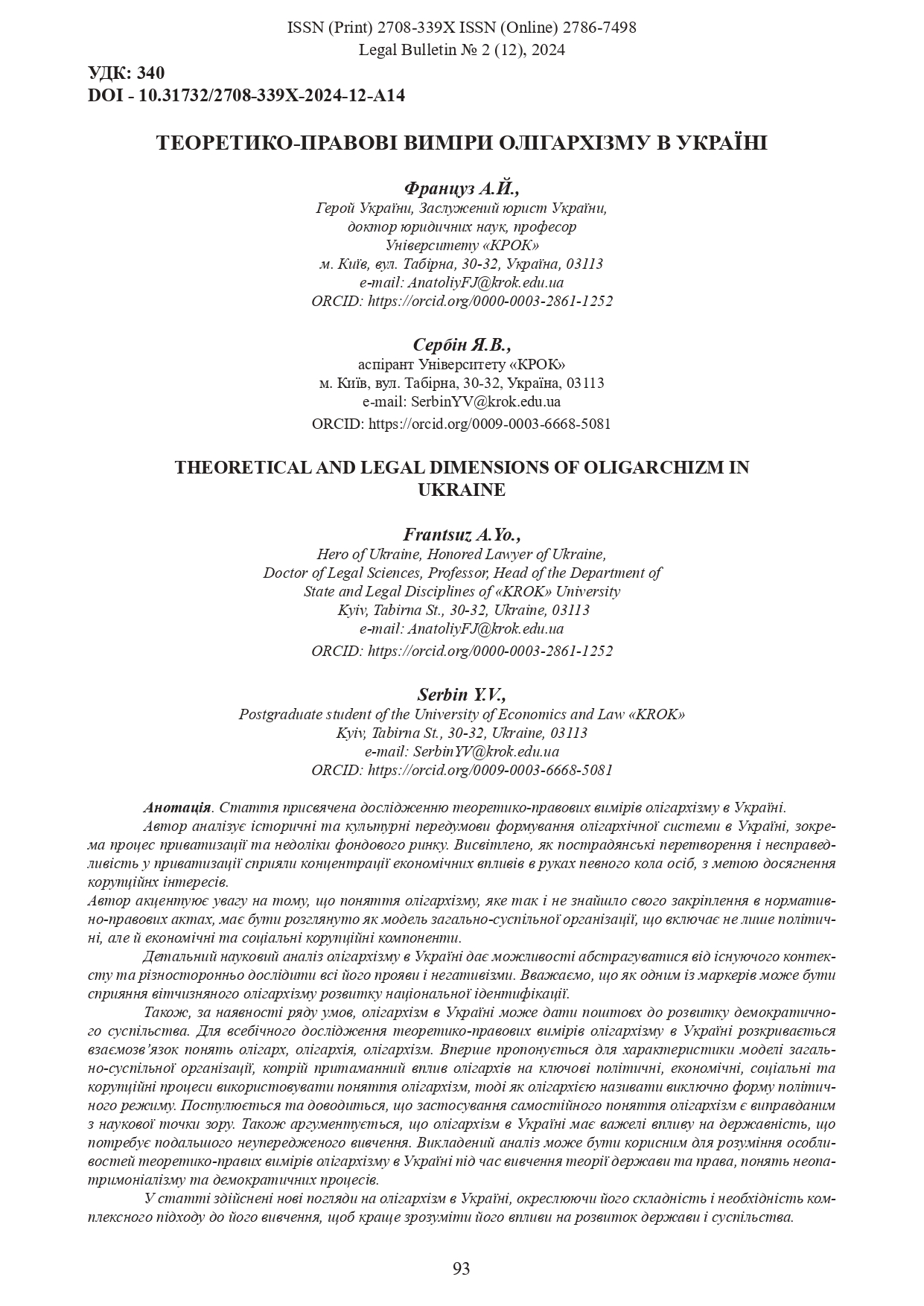THEORETICAL AND LEGAL DIMENSIONS OF OLIGARCHIZM IN UKRAINE
DOI:
https://doi.org/10.31732/2708-339X-2024-12-A14Keywords:
political weight, institutions of state power, law, national security, influence, oligarch, oligarchism, corruptionAbstract
This article is devoted to the study of the theoretical and legal dimensions of oligarchism in Ukraine. The author analyzes the historical and cultural background of the oligarchic system in the country, including the privatization process and the shortcomings of the stock market. It highlights how post-Soviet transformations and injustices during privatization contributed to the concentration of economic influence among a select group of individuals, enabling the pursuit of corrupt interests.
The author emphasizes that the concept of oligarchism, which has not been formally defined in normative legal acts, should be understood as a model of broader social organization that encompasses not only political but also economic and social corruption components. A detailed scientific analysis of oligarchism in Ukraine allows for an abstraction from the existing context, facilitating a comprehensive examination of its manifestations and negative aspects.
It is suggested that the promotion of domestic oligarchism may contribute to the development of national identity. Furthermore, under certain conditions, oligarchism in Ukraine can potentially stimulate the development of a democratic society. The relationship between the concepts of oligarch, oligarchy, and oligarchism is explored to provide a comprehensive understanding of the theoretical and legal dimensions of oligarchism in Ukraine.
For the first time, the article proposes using the term "oligarchism" to characterize a model of social organization marked by the influence of oligarchs on key political, economic, and social corruption processes, while oligarchy is defined exclusively as a form of political regime. The study posits and demonstrates that the independent concept of oligarchism is scientifically justified. Additionally, it argues that oligarchism in Ukraine may have positive aspects influencing statehood, warranting further impartial investigation.
This analysis can aid in understanding the complexities of the theoretical and legal dimensions of oligarchism in Ukraine, particularly in relation to the theory of state and law, neopatrimonialism, and democratic processes. The article presents new perspectives on oligarchism in Ukraine, highlighting its complexity and underscoring the need for a comprehensive approach to its study to better understand its impact on the development of the state and society.
References
Теорія держави і права: підручник / [О. М. Бандурка, О. М. Головко, О.С. Передерій та ін.]; за заг. ред. д-ра юрид. наук, проф., акад. НАПрН України О. М. Бандурки ; МВС України, Харків. нац. ун-т внутр. справ. Харків, 2018. 416 c. URL: http://surl.li/qqksu (дата звернення: 21.02.2024).
Закон України «Про запобігання загрозам національній безпеці, повʼязаним із надмірним впливом осіб, які мають значну економічну та політичну вагу в суспільному житті (олігархів)» Nº1780-IX від 23 вересня 2021p. URL: https://zakon.rada.gov.ua/laws/show/1780-20#Text (дата звернення: 21.02.2024).
Бусол Олена. Якою має бути система протидії олігархізму: нотатки на полях «Закону про олігархів». Юридичний Вісник України. №40 (1368) 8-14 жовтня 2021 р. с. 4-5.
Мельник М.І. Олігархія. Енциклопедія Сучасної України (2022). / ред. І. Дзюба, А. Жуковський, М. Железняк та ін.; НАН України, НТШ. Київ: Інститут енциклопедичних досліджень НАН України, 2022. T. 24. URL: https://esu.com.ua/pdf/file/76415.pdf (дата звернення: 21.02.2024).
Лаф Джон. Система кланового капіталізму в Україні. Складність демонтажу «системи». Липень 2021 р. Chatham House (Королівський інститут міжнародних відносин Лондон). 45 с. URL: http://surl.h/tjpu (дата звернення: 21.02.2024).
Козюк Віктор. Інсайдерське кредитування: що не можна забути, що не варто повторювати. Економічна правда. 24.04.2019. URL: https://www.epravda.com.ua/columns/2019/04/24/647309/ (дата звернення: 21.02.2024).
Михальченко М.І. Кланово-олігархічний режим: негативи і позитиви функціонування. ІПіЕНД ім. І. Ф. Кураса НАН України. Наукові записки. Випуск 49. с. 83-94. URL: https://ipiend.gov.ua/wp-content/uploads/2018/07/mykhalchenko_klanovo.pdf (дата звернення: 21.02.2024).
Мержиєвська Валентина «Ізми» у світі ідеологій, філософій та релігій. Київ: Портал, 2023. 200 с.
Коржов Г. Олігархічна природа сучасного політичного режиму в Україні. Наукові записки. 2008. Серія «Політичні науки». Випуск 3. с. 103-117. URL: https://core.ac.uk/download/pdf/12241591.pdf (дата звернення: 21.02.2024).
Мамонтова Е.В., Ковальова О.О. Клієнтелізм як політико-психологічний феномен. Актуальні проблеми політики. 2020. Вип. 66. с. 65-72. URL: http://surl.li/tlmdj (дата звернення: 21.02.2024).
Зеленько Г. Інтервʼю Ukrlife.TV. 27 квітня 2021 р. URL: http://surl.li/tlycy (дата звернення: 21.02.2024).
Кіндзерський Ю.В. Інституційна пастка олігархізму і проблема її подолання. Економіка України. 2016. №12. с. 22-42. URL: http://surl.li/tlyck (дата звернення: 21.02.2024).
Шишков С.Є. Олігархізм як чинник інституційних деформацій фондового ринку в Україні. Український соціум, 2019, Nº 2 (69). с. 84-96. URL: http://surl.li/tlyru (дата звернення: 21.02.2024).

Downloads
Published
How to Cite
Issue
Section
License
Copyright (c) 2024 Француз А.Й., Сербін Я.В.

This work is licensed under a Creative Commons Attribution 4.0 International License.




